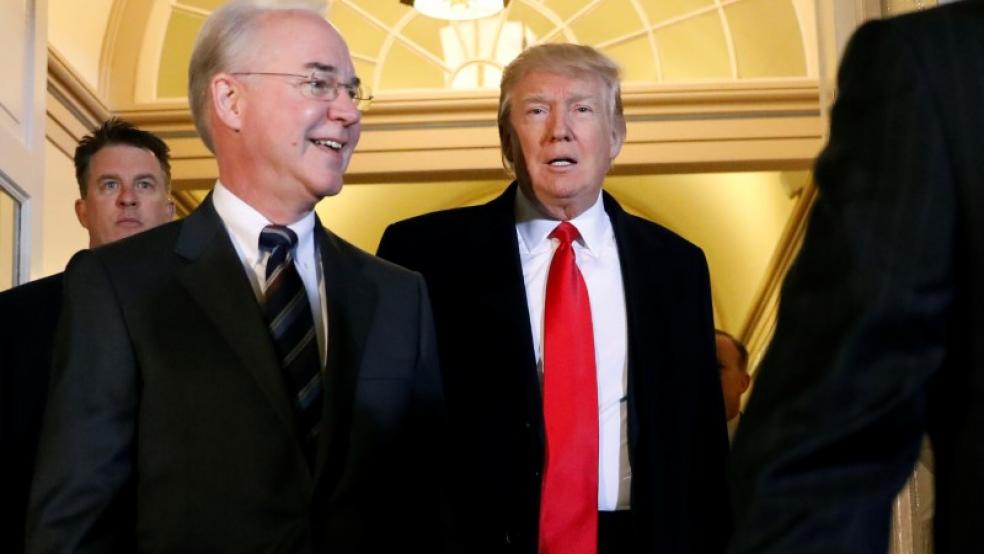When the Department of Health and Human Services issued an angry statement on Tuesday challenging the accuracy of a report in The New York Times that had relied, puzzlingly, on another official statement from HHS, astute observers might have noticed that the wording sounded a little...well...Trumpish.
The article reported that the administration had decided that it would continue to pay out taxpayer funded subsidies to insurance companies covering people through the Affordable Care Act’s health care exchanges. The estimated cost of those subsidies this year is $42.6 billion. The legality of the payments is being challenged in court by the House of Representatives, but withdrawing them would be a dramatic change that could drive insurance companies out of the exchanges.
Related: Trump Team Could Pull the Plug on Obamacare Subsidies for 2018
“The New York Times report is inaccurate,” said the statement, attributed to HHS spokesperson Alleigh Marré. It went on to blast Democrats for failing to contact the administration about ways to help “save” the ACA, and speculated that it was “perhaps because they consider Obamacare to be a losing cause.”
“Democrats need to help solve this failed Obamacare plan...No decisions have been made about how the administration will proceed.”
In retrospect, all the signs were there: The use of “failed” as an adjective. The mangling of common expressions (“losing cause?”) The outright denial of something stated as fact just a day before.
On Thursday, Politico reported that the statement, attributed to Marré, had actually been dictated by President Trump himself in an angry phone call to HHS Secretary Tom Price.
Related: Under Pressure from Insurers, Trump Continues Obamacare Taxpayer Subsidies
Citing multiple sources within the White House, Politico reported that the president had been unhappy to see public confirmation of the plan to pay the taxpayer-funded subsidies because he hoped to use the possible discontinuation of those payments as leverage against Democrats in discussions about potential changes to the legislation.
The subsidies in question are meant to compensate insurers for the costs of covering people who consume large amounts of healthcare services. Because the ACA requires insurers to cover anyone who applies and cannot charge people with pre-existing conditions higher prices than healthy people of a similar age, the subsidies help keep premiums lower than they otherwise would have to be to produce a profit.
House Republicans have long claimed that the subsidy payments are illegal because they are not specifically authorized in the legislation. However, Republican leaders, including House Speaker Paul Ryan have signaled that there would be no effort to force the administration to stop paying them while the case is ongoing, citing the potential disruption to the insurance markets.
The Trump-via-HHS statement issued Tuesday raised the possibility that the subsidies might go away after all -- something that would almost certainly cause some or even all insurers to either abandon the health insurance exchanges entirely or to demand the ability to increase premiums substantially to offset the cost.
Related: Insurer’s Message to Trump: Fix Obamacare or We’re Out
That possibility injected a dangerous element of uncertainty into the decision making of health insurers, said a coalition of business and healthcare associations in a letter to the administration on Wednesday.
“A critical priority is to stabilize the individual health insurance market,” said the letter, which was signed by eight different groups including the Blue Cross and Blue Shield Foundation, the US Chamber of Commerce, and the American Medical Association. “The window is quickly closing to price individual insurance products properly for 2018. The most critical action to help stabilize the individual market for 2017 and 2018 is to remove uncertainty about continued funding for cost sharing reductions.”
Failure to create that certainty, they warned, would lead to fewer choices for consumers, higher premium prices, and would force providers to deliver “more uncompensated care which will further strain their ability to meet the needs of their communities and will raise costs for everyone, including employers who sponsor group health plans for their employees.”
Trump’s thinking on the plan to bring Democrats to the table is unclear at best. Withholding the subsidies and creating a massive disruption in the insurance market would be difficult to spin as something the Democrats forced him to do, considering that they are already being paid and will only stop, in the near term, at least, if Trump orders them to. It’s hard to see how the resulting chaos would be blamed on anybody but Trump.





